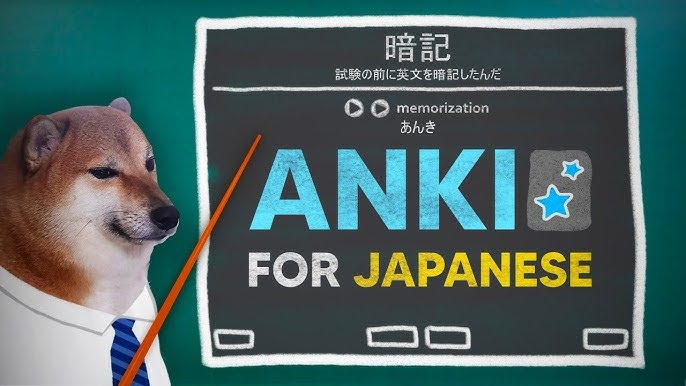- What is Anki?
- How Anki Can Benefit Japanese Learners
- Vocabulary Building
- Grammar Mastery
- Kanji Learning
- Pronunciation
- Using Anki for Japanese: Tips and Techniques
- Creating Effective Decks
- Utilizing Anki Features
- Building a Learning Routine
- Where to Find Anki Resources
- Pre-Made Decks
- Tutorials and Guides
- Anki Communities
- Anki Alternatives
Are you ready to unlock the secrets of Japanese vocabulary and grammar with remarkable efficiency? Anki, a powerful and free spaced repetition system (SRS), can be your secret weapon for mastering the language.
Whether you're a beginner struggling with hiragana or an intermediate learner tackling kanji, Anki can help you achieve fluency faster than ever before.
This article will guide you through the benefits of using Anki for Japanese learning, provide tips for creating effective decks, and point you towards essential resources.
What is Anki?
Anki is a popular flashcard application that employs the principles of spaced repetition. The spaced repetition algorithm is designed to help you remember information more effectively by presenting flashcards at strategic intervals, based on your ability to recall them.
Imagine this: you're studying new Japanese vocabulary, and Anki helps you review those words at increasingly longer intervals, maximizing your retention and minimizing the amount of time you need to spend studying.
Link website: https://apps.ankiweb.net/
Anki offers a wide range of features that make it a powerful tool for language learners:
Customizable Decks: Create decks for specific topics like vocabulary, grammar, kanji, or even pronunciation.
Card Types: Choose from various card types, like basic flashcards, cloze deletion (where you fill in missing words), and image-based cards.
Flexible Formatting: Customize the look and layout of your cards for a more personalized learning experience.
Add-ons: Expand Anki's functionality with add-ons, including audio support, speech recognition, and more.
Cross-Platform Compatibility: Anki is available on desktop and mobile devices, allowing you to study anywhere, anytime.
Free to Use: Anki is completely free, making it accessible to everyone.
How Anki Can Benefit Japanese Learners
Anki is a game-changer for Japanese language learners, offering numerous advantages for mastering vocabulary, grammar, and kanji
Vocabulary Building
Anki is incredibly effective for memorizing new words and kanji characters. It helps you:
Spaced Repetition for Maximum Retention: By reviewing words at strategic intervals, Anki ensures they stay firmly in your long-term memory.
Visual and Auditory Learning: Use image-based flashcards and audio recordings to reinforce learning through multiple senses.
Personalize Your Learning: Create decks tailored to your specific vocabulary needs, whether it's everyday phrases, business Japanese, or specialized vocabulary related to your interests.
Grammar Mastery
Anki can also be a powerful tool for mastering Japanese grammar:
Practice Conjugations: Create flashcards that test your understanding of verb conjugations, particles, and grammar rules.
Visual Examples: Use visual aids like diagrams or example sentences to illustrate grammatical concepts.
Target Specific Grammar Points: Create decks that focus on areas you find challenging, such as noun modifiers, sentence structures, or specific verb tenses.
Kanji Learning
Anki is particularly well-suited for learning kanji:
Visual Representation: The visual nature of Anki flashcards makes it easier to remember complex kanji characters.
Reading and Writing Practice: Create cards that test your ability to read, write, and understand the meaning of kanji.
Radical-Based Learning: Break down kanji into their component radicals (parts) to facilitate memorization.
Pronunciation
While Anki's primary focus is on vocabulary and grammar, it can also be used for pronunciation practice:
Audio Recordings: Add audio recordings of Japanese words and phrases to your flashcards to practice pronunciation.
Phonetic Transcription: Include phonetic transcriptions to help you understand the sounds of Japanese.
Focus on Specific Sounds: Create decks that target challenging sounds or common pronunciation errors.
Using Anki for Japanese: Tips and Techniques
Now that you understand the benefits of Anki, let's dive into tips and techniques for maximizing its potential:
Creating Effective Decks
Start Simple: Begin with basic flashcards that test your knowledge of vocabulary or simple grammar.
Choose the Right Card Type: Experiment with different card types, like basic flashcards, cloze deletion, or image-based cards, to find what works best for you.
Design Engaging Cards: Use vivid images, clear fonts, and concise explanations to make your cards memorable and effective.
Include Context: Try to include example sentences or contexts for each vocabulary word or grammar point to reinforce their meaning and usage.
Utilizing Anki Features
Schedule Reviews: Anki's spaced repetition algorithm will help you review cards at the right time to maximize retention.
Use Add-ons: Explore add-ons to enhance Anki's functionality, such as adding audio recordings, speech recognition, or language-specific features.
Customize Settings: Tweak settings to tailor your learning experience to your preferences.
Building a Learning Routine
Consistency is Key: Set aside a specific time each day for Anki review and stick to a consistent schedule.
Set Realistic Goals: Start with small, achievable goals and gradually increase the number of cards you review each day.
Integrate Anki into Your Study Plan: Use Anki in conjunction with other learning resources, like textbooks, websites, or apps, to create a comprehensive study plan.
Anki’s spaced repetition system allows you to efficiently learn Japanese in 15 minutes a day. By creating a consistent routine, you can make small daily improvements that add up over time. Just a short session each day can greatly enhance retention and reinforce essential Japanese skills
Where to Find Anki Resources
The Anki community is a valuable resource for Japanese learners. Here are some places to find pre-made decks, tutorials, and support:
Pre-Made Decks
AnkiWeb: This website provides a vast library of pre-made decks, including many created by Japanese language learners.
Anki Subreddits: Subreddits like r/Anki and r/LearnJapanese often share Anki decks and offer tips for creating them.
Online Anki Forums: Online forums dedicated to Anki offer a space to connect with other users, ask questions, and share resources.
For those exploring the best sources for learning Japanese, there are numerous pre-made Anki decks available that cater to various levels and specific needs. These decks help streamline your study process by providing you with curated vocabulary, grammar structures, and kanji essentials from reliable sources.
Tutorials and Guides
Anki Website: The official Anki website provides comprehensive documentation and tutorials for using Anki effectively.
YouTube: Search for "Anki Japanese" on YouTube to find videos demonstrating how to create and use Anki for Japanese learning.
Blog Posts: Many language learning blogs offer detailed guides and tips on utilizing Anki for Japanese.
Anki Communities
Anki Forums: Join online forums to connect with other Anki users and ask for advice.
Anki Subreddits: Participate in Anki subreddits to share tips and find helpful resources.
Anki Alternatives
While Anki is a popular choice, other spaced repetition systems (SRS) are available for Japanese learning:
Memrise: Memrise offers engaging and gamified learning, making it a good option for visual learners.
Quizlet: Quizlet is a popular flashcard platform that also offers various study modes and games.
SuperMemo: This advanced SRS is designed for scientific research and offers a more complex approach to memorization.
Experiment with different SRS to find the one that best suits your learning style and preferences.
Anki is a powerful tool that can significantly accelerate your Japanese language learning. By utilizing Anki's spaced repetition system and customizing your learning experience, you can build a strong foundation in vocabulary, grammar, and kanji, ultimately paving the way for fluency
While Anki is a powerful tool, there are also interactive options such as 3DS games for learning Japanese. These games offer an engaging alternative that combines play with language practice, making learning enjoyable and accessible. For some, alternating between Anki and these types of games can keep the learning experience fresh and dynamic
Start creating your Anki decks, explore the available resources, and experience the transformative power of Anki for yourself!





.png)



